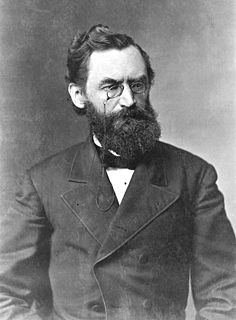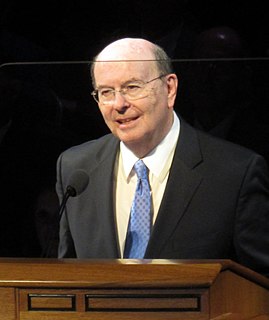A Quote by Galileo Galilei
Philosophy itself cannot but benefit from our disputes, for if our conceptions prove true, new achievements will be made; if false, their refutation will further confirm the original doctrines.
Related Quotes
The path towards sustainable energy sources will be long and sometimes difficult. But America cannot resist this transition, we must lead it. We cannot cede to other nations the technology that will power new jobs and new industries, we must claim its promise. That's how we will maintain our economic vitality and our national treasure-our forests and waterways, our crop lands and snow-capped peaks. That is how we will preserve our planet, commanded to our care by God. That's what will lend meaning to the creed our fathers once declared.
I confidently trust that the American people will prove themselves ... too wise not to detect the false pride or the dangerous ambitions or the selfish schemes which so often hide themselves under that deceptive cry of mock patriotism: "Our country, right or wrong!" They will not fail to recognize that our dignity, our free institutions and the peace and welfare of this and coming generations of Americans will be secure only as we cling to the watchword of true patriotism: "Our country - when right to be kept right; when wrong to be put right."
The truth about our childhood is stored up in our body, and although we can repress it, we can never alter it. Our intellect can be deceived, our feelings manipulated, and conceptions confused, and our body tricked with medication. But someday our body will present its bill, for it is as incorruptible as a child, who, still whole in spirit, will accept no compromises or excuses, and it will not stop tormenting us until we stop evading the truth.
Our conceptions of morality, as all our other ideas, pass through a course of development; the difficulty comes in adjusting our conduct, which has become hardened into customs and habits, to these changing moral conceptions. When this adjustment is not made, we suffer from the strain and indecision of believing one hypothesis and acting upon another.
Our achievements speak for themselves. What we have to keep track of are our failures, discouragements and doubts. We tend to forget the past difficulties, the many false starts, and the painful groping. We see our past achievements as the end results of a clean forward thrust, and our present difficulties as signs of decline and decay.
I believe certain doctrines because God says they are true; and the only authority I have for their truth is the Word of God. I receive such and such doctrines, not because I can prove them to be compatible with reason, not because my judgment accepts them, but because God says they are true. Now this is one of the best services we can render to God,-to submit ourselves to him in our belief of what he has revealed, and ask him to fix his truths in our hearts, and make us obey them.
Thoroughly unprepared, we take the step into the afternoon of life. Worse still, we take this step with the false presupposition that our truths and our ideals will serve us as hitherto. But we cannot live the afternoon of life according to the program of life’s morning, for what was great in the morning will be little at evening and what in the morning was true, at evening will have become a lie.
Style has a profound meaning to Black Americans. If we can’t drive, we will invent walks and the world will envy the dexterity of our feet. If we can’t have ham, we will boil chitterlings; if we are given rotten peaches, we will make cobblers; if given scraps, we will make quilts; take away our drums, and we will clap our hands. We prove the human spirit will prevail. We will take what we have to make what we need. We need confidence in our knowledge of who we are.
Electronic brains may help us to use our heads but will not excuse us from that duty, and as to our hearts-cardiograms cannot diagnose what may be most ill about them, or confirm what may be best. The faithful woman and the versatile brave man, the wakeful intelligence open to inspiration or grace-these are still exemplary for our kind, as they always were and always will be.





































